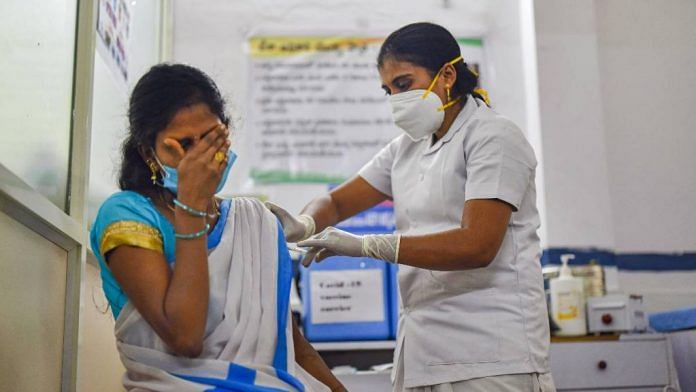New Delhi: Indian studies have shown that antibodies generated by Covid vaccines persist for upto a year and, therefore, talk about booster doses is not pertinent right now, Indian Council of Medical Research (ICMR) Director General Dr Balram Bhargava said Thursday.
Bhargava’s comments come as studies seek to establish the duration of the current Covid vaccines’ efficacy, and whether people will need to take boosters for continued protection against the novel coronavirus. US President Joe Biden received a booster shot Monday after the country’s federal regulators recommended a third dose of the Pfizer vaccine for certain high-risk population groups.
“Currently, the talk of the booster dose is not pertinent. The call of the hour is to give the two-dose vaccination, which we call full vaccination covering the entire adult population. That has to be the goal and that is the agenda and that has to be continued,” Dr Bhargava said, replying to a question during the Covid briefing.
“We have had some studies in India, including Bangalore, where some hospitals looked at the antibodies and found that 95 per cent antibodies persist for more than a year. Therefore, the talk of booster is not pertinent.”
India started Covid vaccinations from 16 January, which means that even for those who got fully vaccinated the earliest, only a little over seven and a half months have elapsed.
When India started vaccinations, both the vaccines initially included in the immunisation programme — Covishield and Covaxin — were being administered at a 28-day gap. The earliest Indian to be vaccinated thus received the second shot sometime around mid-February.
Healthcare workers were the first ones to receive the vaccine, but so far only 85 per cent of hospital staff are fully vaccinated, according to government estimates. Around 99 per cent have received one shot of the vaccine. Among other frontline workers, which include police personnel, sanitation staff, etc, 100 per cent have received one shot and 82 per cent are fully vaccinated.
Overall, 69 per cent of adult Indians have received one shot and 25 per cent are fully vaccinated. However, there are emerging concerns about people not getting their second shot on time.
“There are certain states where the second-dose coverage is on the lower side and we have taken this up with them,” Union Health Secretary Rajesh Bhushan said.
“We have provided a facility on CoWin where line listing of people who missed the second dose can be generated. States have got those and are trying to ensure a second dose is given to these people.”
Also Read: 72% Indians confident Covid vaccines effective, 60% trust Indian shots, new survey finds
Most districts of concern in the northeast
While Kerala continues to account for over 50 per cent of the active cases in the country, absolute numbers in the state are coming down, as are the national numbers.
Most of the 18 “districts of concern”, where test positivity ranges between 5 per cent and 10 per cent, are in the northeast. These are Chandel Kakching and Ukhrul in Manipur, Khawzawl and Kolasib in Mizoram, Upper Siang and Lower Siang in Arunachal Pradesh, East Khasi Hills and South-west Khasi Hills in Meghalaya, North and East districts in Sikkim, Dimapur, Tuensang of Nagaland, and Golaghat in Assam.
Both secretaries warned that the upcoming festival season is the time to “celebrate with caution” and that all non-essential travel should be avoided.
Zycov-D would be priced differently
Bhushan remained non-committal about a possible date when Zydus Cadila’s Zycov-D — the world’s first DNA vaccine, and approved by the government for emergency use — would be rolled out in the national programme.
However, he made it clear that the vaccine will be priced differently from Covishield and Covaxin.
“Since Zycov-D is needle-less and a three-dose vaccine, it will be priced differently from the vaccines currently being used,” Bhushan said.
The Government of India currently procures Serum Institute of India’s Covishield at Rs 205 per dose and Bharat Biotech’s Covaxin at Rs 215 per dose. The vaccines are administered using special syringes that are 0.5 ml in size and usually cost around Rs 2.
Meanwhile, a special applicator has to be used for Zycov-D that costs Rs 30,000 and can be used for 20,000 shots. This means that the applicator gun would have to changed after vaccinating every 10,000 people as each dose of the vaccine comprises two shots.
(Edited by Sunanda Ranjan)
Also Read: In virus vs immune system race, Covid booster is the privilege scientists say will curb delta



